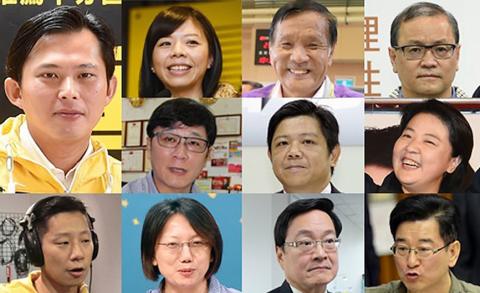The Democratic Progressive Party (DPP) Central Standing Committee yesterday passed a list of non-DPP legislative candidates to support, with an eye on uniting their efforts to defeat Chinese Nationalist Party (KMT) nominees.
“Considering the overall situation heading into the legislative elections, the Campaign Strategy Committee suggested that the DPP support legislative candidates in constituencies where it is expected to be difficult for the party to win,” Campaign Strategy Committee convener Su Jia-chyuan (蘇嘉全) said at a meeting in Taoyuan. “We seek to cooperate with them as allies, with victory in the elections our ultimate goal.”
The “allies” chosen by the Campaign Strategy Committee include New Power Party legislative nominees Huang Kuo-chang (黃國昌) in New Taipei City’s 12th electoral district, Freddy Lim (林昶佐) in Taipei’s fifth electoral district, Hung Tzu-yung (洪慈庸) in Taichung’s third electoral district, as well as People First Party candidate Vivian Huang (黃珊珊) in Taipei’s fourth electoral district, Green Party-Social Democratic Party candidate Fan Yun (范雲) in Taipei’s sixth electoral district and Taiwan Solidarity Union nominee Liu Kuo-lung (劉國隆) in Taichung’s fifth electoral district.

Photo: Taipei Times
Also among the allies are independent candidates Lee Hsing-chang (李幸長) in New Taipei City’s ninth electoral district, and in Taipei: Billy Pan (潘建志) in the third electoral district, Yang Shih-chiu (楊實秋) in the seventh, Lee Ching-yuan (李慶元) in the eighth, as well as Chao Cheng-yu (趙正宇) in Taoyuan’s sixth electoral district.
Su’s proposal received overwhelming support in the Central Standing Committee meeting, which adopted it immediately.
“The DPP supports candidates who would most threaten a KMT victory, without the precondition that the candidate must support the DPP’s presidential candidate in return,” DPP spokesperson Yang Chia-liang (楊家俍) said. “We would negotiate with them to see how we could cooperate in the election.”

Photo: CNA

A preclearance service to facilitate entry for people traveling to select airports in Japan would be available from Thursday next week to Feb. 25 at Taiwan Taoyuan International Airport, Taoyuan International Airport Corp (TIAC) said on Tuesday. The service was first made available to Taiwanese travelers throughout the winter vacation of 2024 and during the Lunar New Year holiday. In addition to flights to the Japanese cities of Hakodate, Asahikawa, Akita, Sendai, Niigata, Okayama, Takamatsu, Kumamoto and Kagoshima, the service would be available to travelers to Kobe and Oita. The service can be accessed by passengers of 15 flight routes operated by

MORE FALL: An investigation into one of Xi’s key cronies, part of a broader ‘anti-corruption’ drive, indicates that he might have a deep distrust in the military, an expert said China’s latest military purge underscores systemic risks in its shift from collective leadership to sole rule under Chinese President Xi Jinping (習近平), and could disrupt its chain of command and military capabilities, a national security official said yesterday. If decisionmaking within the Chinese Communist Party has become “irrational” under one-man rule, the Taiwan Strait and the regional situation must be approached with extreme caution, given unforeseen risks, they added. The anonymous official made the remarks as China’s Central Military Commission Vice Chairman Zhang Youxia (張又俠) and Joint Staff Department Chief of Staff Liu Zhenli (劉振立) were reportedly being investigated for suspected “serious

ENHANCING EFFICIENCY: The apron can accommodate 16 airplanes overnight at Taoyuan airport while work on the third runway continues, the transport minister said A new temporary overnight parking apron at Taiwan Taoyuan International Airport is to start operating on Friday next week to boost operational efficiency while the third runway is being constructed, the Ministry of Transportation and Communications said yesterday. The apron — one of the crucial projects in the construction of the third runway — can accommodate 16 aircraft overnight at the nation’s largest international airport, Minister of Transportation and Communications Chen Shih-kai (陳世凱) told reporters while inspecting the new facility yesterday morning. Aside from providing the airport operator with greater flexibility in aircraft parking during the third runway construction,

American climber Alex Honnold is to attempt a free climb of Taipei 101 today at 9am, with traffic closures around the skyscraper. To accommodate the climb attempt and filming, the Taipei Department of Transportation said traffic controls would be enforced around the Taipei 101 area. If weather conditions delay the climb, the restrictions would be pushed back to tomorrow. Traffic controls would be in place today from 7am to 11am around the Taipei 101 area, the department said. Songzhi Road would be fully closed in both directions between Songlian Road and Xinyi Road Sec 5, it said, adding that bidirectional traffic controls would